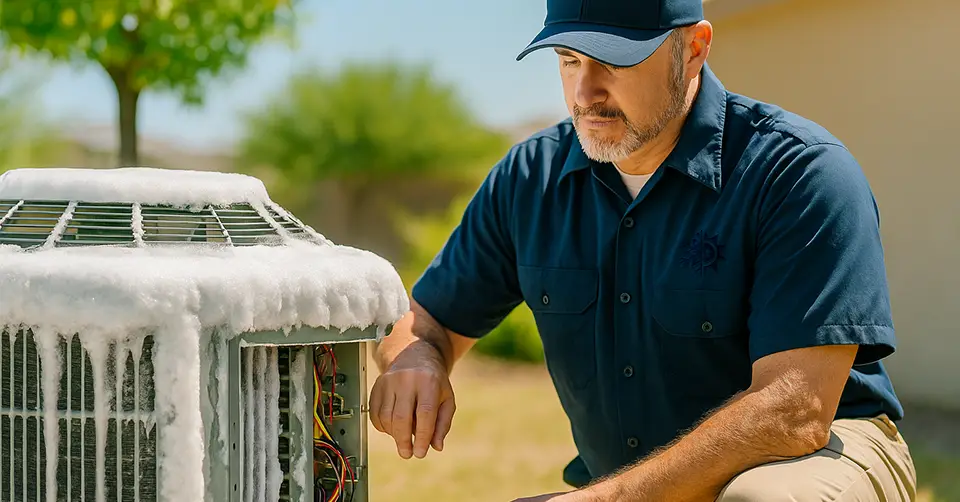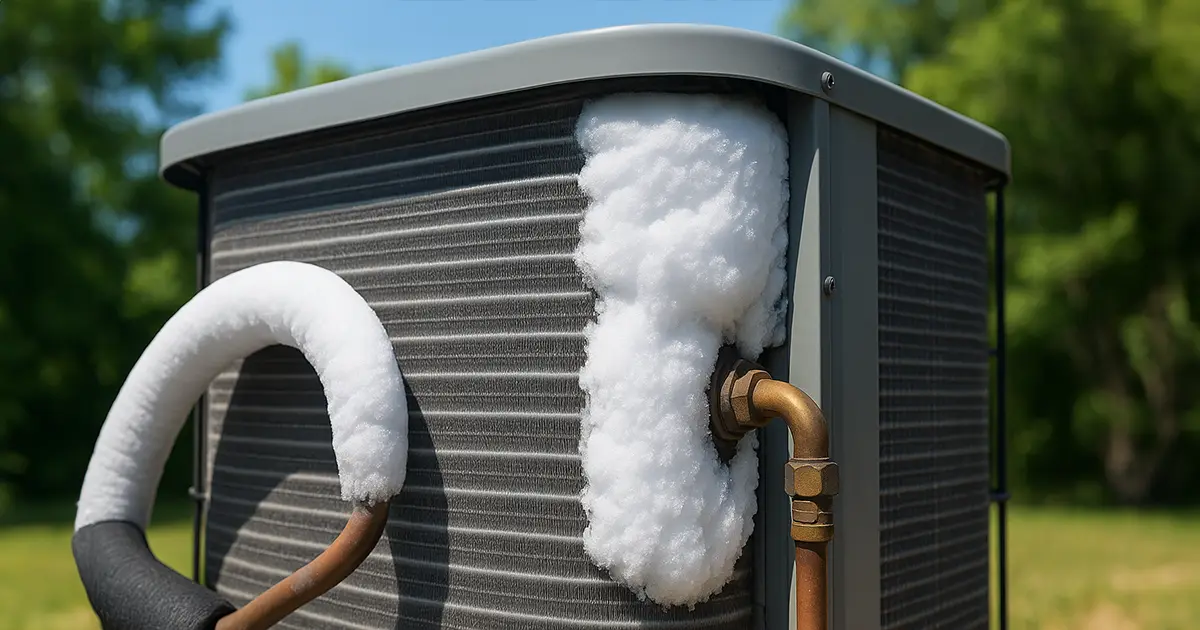It doesn’t make sense at first. The Texas summer is blazing hot, your AC is working overtime, and suddenly… it’s frozen. Literally. Your system stops cooling, and a thin layer of ice starts forming where it shouldn’t.
Most homeowners assume freezing is a winter problem, but HVAC systems are just as likely to ice up when the sun’s beating down hardest.
The good news? A frozen air conditioner doesn’t always mean a significant breakdown. But it’s not something to ignore, either. Let’s break down why this happens, what you can do about it, and how to keep it from becoming a costly problem in the future.
What’s Actually Happening When Your AC Freezes
Your air conditioner absorbs heat from inside your home and releases it outdoors. To do this, it uses refrigerant, an extremely cold chemical that moves through the evaporator coil inside your home. Warm air flows across that coil cool down and circulates back into your living space.
But if the coil gets too cold or warm, air stops flowing over it correctly, and things start to freeze up. Ice begins to form on the coil or refrigerant lines. Before long, the system can’t longer pull heat from the air, and the cooling stops altogether.
So why would a coil meant to be cold get too cold? That usually comes down to airflow issues, refrigerant trouble, or mechanical failure… each of which can spiral into a complete freeze.
1. Low Refrigerant Is Often the First Red Flag
Refrigerant is the lifeblood of your cooling system. If levels drop because of a leak, the pressure inside the coil drops too. This causes the refrigerant to expand too much and get too cold. That’s when the ice starts to build.
One clue this might be happening: you notice hissing or bubbling noises near the unit. Another: it’s running constantly, but the house still feels warm. A frozen coil is sometimes the final symptom.
Refrigerant leaks are not a DIY fix. Not only is handling refrigerant unsafe without certification but simply adding more without finding the leak just kicks the can down the road.
2. Clogged Air Filters Choke the System
This one’s simple and prevalent. When filters go unchanged for too long, airflow slows way down. That means less warm air over the coil, allowing it to get colder until it ices up.
If you only remember one thing, check your air filter monthly. Replacing a clogged filter takes five minutes and might save you from a multi-day AC outage in the middle of July.
3. Vents and Ducts That Can’t Breathe
The return and supply ducts in your system need to move air in and out freely. If furniture, rugs, or curtains block vents, or if you’ve closed off too many to “save money”, the system loses its ability to regulate temperature properly. Air starts pooling in the system, and that trapped air is often cold enough to freeze things from the inside.
The same problem can happen when ductwork is undersized or partially collapsed. If you’re not getting even airflow room to room, or if some areas feel muggy while others feel like a meat locker, it’s worth scheduling a duct inspection.
4. Dirty or Damaged Coils Are a Hidden Ice Magnet
Evaporator coils can get dirty just like anything else. That layer of grime acts like insulation and prevents heat from being absorbed. The refrigerant keeps cycling through, but the coil can’t warm up enough to stay in balance, so it freezes.
Sometimes, the coil isn’t just dirty; it’s damaged. Cracks or corrosion in the coil can mimic the same freezing pattern. In either case, ignoring it for too long will eventually lead to a total system shutdown.
5. Fan or Blower Problems Cause Internal Overheating
If the blower fan is running too slow or not spinning at all, air can’t flow over the coil like it should. Ironically, that can cause the coil to freeze.
The fan’s job is to push warm air across the evaporator coil and circulate cool air through the ducts. When it can’t do that, cold builds up in the wrong places.
You might notice rattling, odd humming, or weak airflow from the vents. If so, it’s time to look into the blower motor before it creates bigger problems.
6. Thermostat Glitches Aren’t Just Inconvenient
Sometimes, the thermostat sends the wrong signal and keeps your system running even when the house is cool enough. That overcooling can eventually freeze the system. This is more common when nighttime temperatures dip below 60°F, and the system isn’t equipped to adjust.
Smart thermostats or ambient temperature sensors help prevent this, especially in areas like Paradise, where late summer evenings can cool down unexpectedly.
7. Clogged Drain Line = Frozen System
Your AC doesn’t just cool the air… it removes moisture, too. That moisture collects and drains away through a small pipe called the condensate drain line. Water backs up into the unit when that line is clogged and freezes along the coil or drain pan.
If your system suddenly shuts off or you notice pooling water around the air handler, the drain line is a likely suspect.
What to Do When Your AC Is Already Frozen
First step: shut the system off. If it keeps running while frozen, the most expensive part of your HVAC system, the compressor, could be damaged.
Once it’s off, turn the fan setting on. That will circulate air through the system without cooling, helping melt the ice naturally. You can also use a hair dryer to carefully speed up the thaw, but keep it on a low setting and avoid touching any wires or tubing.
Give it a whole day to defrost before restarting. Then, change the filter, unblock the vents, and double-check your thermostat settings. If it freezes again, call in a professional.
How to Prevent It from Happening Again
Most freeze-ups can be prevented with a few consistent habits:
- Check and replace your air filter every month: especially during high-use months.
- Keep vents open and unblocked: Rearrange furniture if needed.
- Watch for early signs of airflow issues: uneven cooling, weak vent airflow, or strange noises.
- Schedule annual maintenance: with a licensed HVAC technician to check refrigerant levels, clean coils, inspect wiring, and calibrate your system.
Preventative maintenance in spring saves you the stress and discomfort of mid-summer breakdowns.

Should You Repair or Replace?
If your AC unit is under 7 years old and this is the first or second freeze-up, it’s usually fixable. Airflow problems, refrigerant recharges, or a simple cleaning can keep things running for years.
But if you’re dealing with repeated issues, especially if the unit is 10+ years old, it may be time to upgrade. New systems are quieter, more energy efficient, and have innovative features that protect against common failures like these.
Empire Heating & Air can help you make that decision confidently based on the age, condition, and efficiency of your current system.
Keep Your Cool with Empire Heating & Air
A frozen AC in the middle of a Texas summer is more than inconvenient. It’s miserable, and quite possibly dangerous. But it’s also something you can prevent, manage, and fix with the right help.
Whether you need a quick repair, a seasonal tune-up, or a total replacement, Empire Heating & Air in Paradise, TX, is here to help you stay cool and comfortable all year.
Don’t let summer heat turn into an HVAC emergency. Contact us today at (682) 233-3367 to schedule a visit from our expert technicians.

